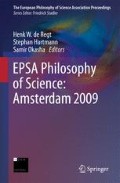Abstract
Much recent discussion in social epistemology has focussed on the question of whether peers can rationally sustain a disagreement. A growing number of social epistemologists hold that the answer is negative. We point to considerations from the history of science that favor rather the opposite answer. However, we also explain how the other position can appear intuitively attractive.
Access this chapter
Tax calculation will be finalised at checkout
Purchases are for personal use only
Notes
- 1.
- 2.
For present purposes, “doxastic attitude” denotes either outright belief, outright disbelief, or suspension of judgment. Some (e.g., Christensen [2007] and Elga [2007]) have preferred a treatment in terms of degrees of confidence. As will be seen, some of the arguments presented here carry over to the alternative treatment.
- 3.
A point that was also forcefully argued for in Hanson [1958].
- 4.
- 5.
See on this also Lugg [1978:286f].
- 6.
It is not clear that those considerations apply quite generally. We expect from scientists that they are able to critically reflect upon their own proposals. We do not have the same expectation of, say, religious people.
- 7.
Notice that this is not the only way in which two agents can disagree. After all, it may also be that one agent suspends judgment while the other holds a belief (disbelief). For convenience’s sake, we will often restrict our focus to cases in which the parties to the disagreement hold contrary beliefs.
- 8.
- 9.
This, we take it, is the core point of Elga’s [2007, Sect. 10] bootstrapping argument.
- 10.
- 11.
For the record, we think that scholarly disputes often approximate the ritualized way of communication closely enough.
- 12.
Notice that the two databases differ from the communities of agents modelled in Douven [2010], which adopt different policies to deal with disagreements, to wit, “sticking to their guns” and “splitting the difference,” respectively. After all, even the tension-resolving database may come to the conclusion that the right thing to do is to split the difference.
- 13.
This point is very much in line with the results presented in Douven [2010], which stress the importance of contingent facts to the rationality of disagreements.
- 14.
We are indebted to Henk de Regt and Fred Muller for valuable discussions on the topic of this paper.
References
Alston, W. 1985. Concepts of epistemic justification. The Monist 68: 57–89.
Christensen, D. 2007. Epistemology of disagreement: The good news. Philosophical Review 116: 187–217.
De Regt, H.W. 1996. Philosophy and the kinetic theory of gases. British Journal for the Philosophy of Science 47: 31–62.
Douven, I. 2009. Uniqueness revisited. American Philosophical Quarterly 46: 347–361.
Douven, I. 2010. Simulating peer disagreements. Studies in History and Philosophy of Science 41: 148–157.
Elga, A. 2007. Reflection and disagreement. Noûs 41: 478–502.
Feldman, R. 2005. Respecting the evidence. Philosophical Perspectives 19: 95–119.
Feldman, R. 2006. Epistemological puzzles about disagreement. In Epistemology futures, ed. S. Hetherington, 216–236. Oxford: Oxford University Press.
Feldman, R. 2007. Reasonable religious disagreements. In Philosophers without gods: Meditations on atheism and the secular life, ed. L. Antony, 194–214. Oxford: Oxford University Press.
Feldman, R. 2009. Evidentialism, higher-order evidence, and disagreement. Episteme 6: 294–312.
Goldman, A.I. 1999. Knowledge in a social world. Oxford: Oxford University Press.
Goldman, A.I. 2010. Epistemic relativism and reasonable disagreement. In Disagreement, eds. R. Feldman and T. Warfield, 187–215. Oxford: Oxford University Press.
Hanson, N.R. 1958. Patterns of discovery. Cambridge: Cambridge University Press.
Kelly, T. 2005. The epistemic significance of disagreement. Oxford Studies in Epistemology 1: 167–197.
Kuhn, T. 1962/1996. The structure of scientific revolutions (3rd ed.). Chicago, IL: Chicago University Press.
Kuhn, T. 1970. Reflections on my critics. In Criticism and the growth of knowledge, eds. I. Lakatos and A. Musgrave, 231–78. London: Cambridge University Press.
Kuhn, T. 1977. Objectivity, value judgment, and theory choice. In The essential tension, 320–39. Chicago: University of Chicago Press.
Lugg, A. 1978. Disagreement in science. Journal for General Philosophy of Science 9: 276–292.
Popper, K.R. 1975. The rationality of scientific revolutions. In Scientific revolutions: Progress and obstacles to progress, ed. R. Harré, 72–101. Oxford: Clarendon Press.
Rosen, G. 2001. Nominalism, naturalism, philosophical relativism. Philosophical Perspectives 15: 69–91.
Thagard, P. 1998a. Ulcers and bacteria I: Discovery and acceptance. Studies in History and Philosophy of Biology and Biomedical Sciences 29: 107–136.
Thagard, P. 1998b. Ulcers and bacteria II: Instruments, experiments and social interactions. Studies in History and Philosophy of Biology and Biomedical Sciences 29: 317–342.
van Inwagen, P. 1996. It’s wrong, always, everywhere, and for anyone, to believe anything, upon insufficient evidence. In Faith, freedom, and rationality, eds. J. Jordan and D. Howard-Snyder, 137–154. Lanham MD: Rowman and Littlefield.
Wedgwood, R. 2007. The nature of normativity. Oxford: Oxford University Press.
Author information
Authors and Affiliations
Corresponding author
Editor information
Editors and Affiliations
Rights and permissions
Copyright information
© 2012 Springer Science+Business Media B.V.
About this paper
Cite this paper
Kelp, C., Douven, I. (2012). Sustaining a Rational Disagreement. In: de Regt, H., Hartmann, S., Okasha, S. (eds) EPSA Philosophy of Science: Amsterdam 2009. The European Philosophy of Science Association Proceedings, vol 1. Springer, Dordrecht. https://doi.org/10.1007/978-94-007-2404-4_10
Download citation
DOI: https://doi.org/10.1007/978-94-007-2404-4_10
Published:
Publisher Name: Springer, Dordrecht
Print ISBN: 978-94-007-2403-7
Online ISBN: 978-94-007-2404-4
eBook Packages: Humanities, Social Sciences and LawPhilosophy and Religion (R0)

